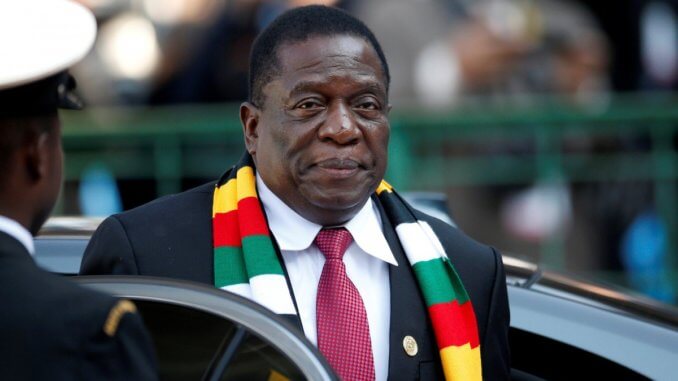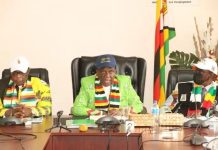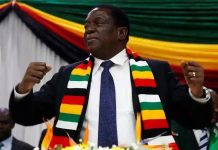STATE Houses by nature and for security considerations are no go areas for ordinary people, but not with President Mnangagwa who has not hesitated to invite his fellow citizens to his official residence when a need arises to address issues affecting the country, even emotive ones.
The day 14 February 2020 was no exception as the President flung open the gates of the State House in Bulawayo for a frank and open discussion between himself and Civil Society Organisations from Matabeleland over the post-independence disturbances in Matabeleland and Midlands commonly known as Gukurahundi and other issues closer to the region’s heart.
For that gesture, President Mnangagwa has been lauded for his immeasurable show of commitment as he moves to heal one of the sad chapters of the country’s history. It is a complete departure from the previous political administration era where the issue of post independence disturbances could not be discussed openly.
President Mnangagwa has lived to his word that the cornerstone of the Second Republic is dialogue in pursuit of solutions to issues affecting the country. In engagements, never seen before in the history of the country, especially initiated by the Head of State, the Bulawayo State House meeting between President Mnangagwa and civil society organisations, has given a great sense of hope in the resolution of sticking issues in the region but more importantly that the country can move ahead in unity and work towards the common goal of economic emancipation.
Speaking at their second engagement at the State House in Bulawayo recently, following the initial discussion in March last year at the same venue, the co-ordinator of Matabeleland Collective, a grouping of civil society organisations from the region, Ms Jenny Williams said the President’s gesture of coming down to the people showed hope for the people of Matabeleland.
Various groupings from around Bulawayo, Kezi, Gwanda, Lupane, Umzingwane and Beitbridge thronged the official residence of the President where they spoke their minds out in a relaxed manner without fear and that resonated with the theme of the day as it was Valentine’s Day, a day set aside globally for the expression of love.
They shared their concerns with the President who also proffered solutions to some of the pressing issues. The Secretary of the Ministry of Justice, Legal and Parliamentary Affairs Mrs Virginia Mabhiza was the first to take the stand and spoke about the implementation of issues discussed during the first meeting in March last year requiring Government intervention.
She delivered 16 of the things that were discussed, the implementation modalities, timeframes set, the enablers and the status of the projects. The issues brought about included acquiring of birth and death certificates where the Registrar General’s office was responsible in ensuring that survivors of that period get the documents as a matter of urgency.
“In terms of progress let me report to say that consultations have been made to the RGs office, we are waiting for the date of the official launch of the roll out programme where we anticipate that people get the documents from the comfort of their communities,” said Mrs Mabhiza.
Mrs Mabhiza castigated some sections of society that had attempted to do illegal exhumations of the victims of Gukurahundi saying the process was to be done in an orderly and legal manner. Another matter she raised was that of the provision of medical and psycho-social support for the communities. This includes counselling for the affected people and the Ministry of Health and Child Care was going to work on that area.
“We do not require a launch for this one, the line ministries must simply go into the communities and assist the people in issues to do with health,” she said.
Mrs Mabhiza also spoke of social service delivery to the people, increasing participation of women in Parliament, Cabinet and governance in general, creating an NGO for which will be a platform for State and non-State actor’s engagement and the extension of the lifespan of the National Peace and Reconciliation Commission, among other issues mentioned in the matrix.
She also spoke about allegations of corruption in Rural District Councils particularly in Matabeleland region and said investigations were in progress. Ms Williams explained the value of the engagement.
“It is very important that people must realise the importance of seeing the President sitting up there together with the people hearing him dialoguing and asking questions. That is a vital healing step that people should not underestimate. Whether people asked questions or not the point is that there is a platform, people are dialoguing, it is a big step. We thank him for calling us and asking us to give him both negative and positive feedback from our previous discussion. We did exactly as he instructed,” she said.
Ms Williams said civic society must play a watchdog role to the Government.
“We should be a watchdog of the Government, monitoring and also engaging where we should engage,” she said.
Topical issues that the collective and the greater civic society raised included national identity documents for survivors of the Gukurahundi period which they described as low-hanging fruits.
“The birth and death certificates issue is a low-hanging fruit. We think this is an issue that we can take back to the communities with results as soon as possible. We want people to have the correct documents with names well spelt unlike what is taking place where names are misspelt. It’s a thorny issue for the people in this region,” said Ms Williams.
The President also highlighted that paperwork has started to make sure that the Matabeleland Zambezi Water Project, seen as the solution to water problems in the region, becomes a reality since it was proposed in 1912.
“I am happy to announce that considerable progress has been made towards the implementation of this project through discussions that have been made between Government and civil society. I am informed by the Attorney-General’s office that it has compiled a draft agreement between the Government and the affected communities of the region gathering the rules and parameters of the implementation of the project,” he said.
He also stressed that it was necessary that promoters of the project take on board desires and expectations of the communities around which the project will pass through. It is also envisaged that once the Zambezi Water Project is completed it will bring economic growth and create jobs for the region. The Gwayi Shangani dam, which is the first phase of the project, is expected to be completed this year.






